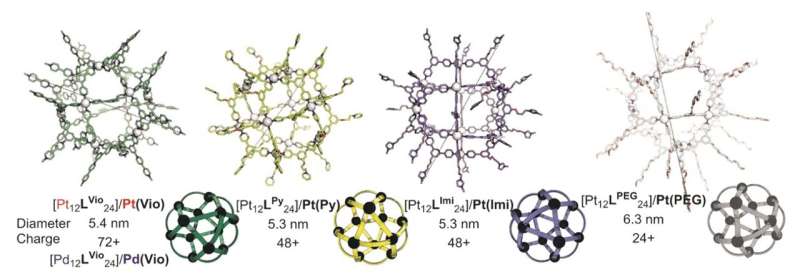Little interfering RNAs (siRNAs) are unique therapies that can be utilized to deal with a vast array of illness. This has actually caused a growing need for selective, effective, and safe methods of providing siRNA in cells. Now, in a cooperation in between the Universities of Amsterdam and Leiden, scientists have actually established devoted molecular nanocages for siRNA shipment. In a paper simply out in the journal Chem they provide nanocages that are simple to prepare and show tunable siRNA shipment qualities.
The scientists were encouraged by the capacity of siRNA in gene treatment, which needs the requirement for reliable shipment systems. They set out to establish nanocages with practical groups at the outdoors, making the cages efficient in binding siRNA hairs. As the binding is based upon reversible bonds, the siRNA can in concept be launched in a cellular environment. To check out the shipment qualities of their nanocages, the scientists carried out a lab research study utilizing numerous human cancer cells.
A variety of nanocages
The nanocages are building and constructions of little molecular foundation, so-called ditopic ligands, that are linked utilizing metal atoms. A common cage includes 12 metal atoms and 24 ligands, for this reason the abbreviation M12L24. The scientists created and manufactured 5 various ligands to form molecular cages with various siRNA binding affinities. They then prepared a series of siRNA binding nanocages utilizing platinum or palladium as linking metal. The palladium nanocages are less steady in a cellular environment, and decay is among the siRNA launching systems.

After screening nanocage qualities such as stability and siRNA binding ability, the shipment qualities were tested in assays based upon siRNA-mediated Green Fluorescent Protein (GFP) silencing. The cages were utilized to provide siRNA to human GFP-expressing cells, so that fluorescence measurements might develop effective siRNA shipment. 2 kinds of human cell lines were utilized: HeLa and U2Os.
Cage structure identifies siRNA shipment
To their surprise, the scientists might not just show pleasing siRNA shipment, however likewise found an exceptional distinction depending upon the metal utilized in the nanocage. Where a platinum-based Pt12L24 nanocage revealed extremely reliable siRNA shipment to U2OS cells, it revealed little effectiveness for HeLa. By contrast, the palladium-based Pd12L24 nanocage, stemmed from the exact same ligand foundation, provided siRNA to HeLa however not to U2OS. Such distinction might not be observed in experiments were a commercially used shipment system (lipofectamine) was utilized. The M12L24 nanocages therefore present the possibility of tuning siRNA shipment qualities by tuning the nanocage structure.
In their Chem paper, the scientists consider this special cell selectivity function of the nanoparticles an appealing addition to the field of targeted RNA gene product shipment, whose complete capacity is yet to be revealed. Although the present outcomes were gotten in extremely managed lab research study, they anticipate that the tunable RNA shipment of their nanocages will generate future advancements of extremely preferable selective RNA nanomedicines.